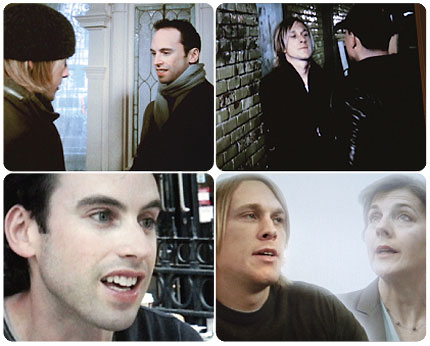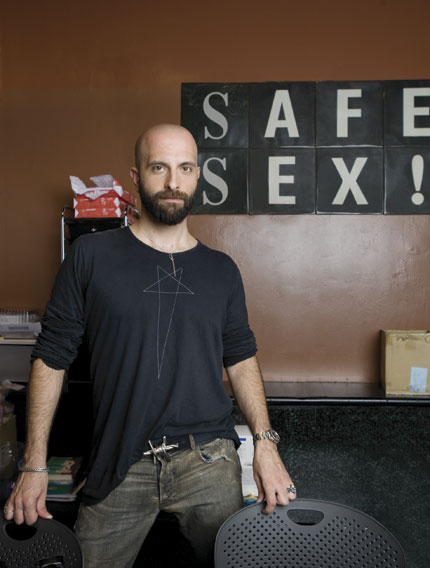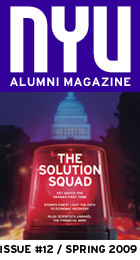prevention
Out of the Clinic
With HIV cases soaring, researchers bring facts—and free screenings—to the gay hookup scene
by Alex Cotton / GSAS ’08
It’s after midnight on a Saturday and the West Side Club in New York City’s Chelsea neighborhood is getting crowded. Men in towels wander through a dimly lit labyrinth of narrow hallways as techno music throbs. Breaking off from the crowd, two men enter a cramped room with blank walls and a bare mattress and shut the door. It’s business as usual, until the music suddenly stops. “Welcome to the West Side Club,” says a cheerful voice over the speakers. “For free, confidential HIV testing, just follow the arrows…” An Online Soap Opera centers on the trials of a young gay man who fears he might be HIV positive.
An Online Soap Opera centers on the trials of a young gay man who fears he might be HIV positive.
The owner of this voice is Demetre Daskalakis, a physician and assistant professor of infectious diseases at the NYU School of Medicine, who runs the first-ever HIV testing venue at a New York bathhouse. Though long a part of the underground sex scene in the United States, as well as nodes of the HIV epidemic, until now no one had brought testing into a New York club. But as the rate of infections continues to climb among gay men—a study by the city’s Department of Health and Mental Hygiene showed New York’s rate was three times the national average—doctors and researchers are increasingly offering information and screenings to those most at risk at the actual sites of hookups, whether it’s bathhouses or gay Internet dating sites.
In a private room located at the back of the club, Daskalakis administers rapid HIV tests that deliver results in 20 minutes. The idea is to provide much-needed services and collect groundbreaking data, such as whether or not these men discuss their HIV status with partners. “Other cities have been doing HIV testing in bathhouses, but not in a structured, academic way,” says Daskalakis, who, dressed head to ankles in black, with a full beard, shaved head, and silver sneakers, blends well with the club-like vibe.
Since he started in 2006, Daskalakis has tested nearly 1,400 people, both bathhouse regulars and an Internet crowd he has found by advertizing on gay hookup Web sites that post his messages for free. In fact, half of his clients don’t come for the bathhouse at all; they just want to get tested. Daskalakis believes that this is because he offers a judgment-free environment. “By putting it in one of the most stigmatized venues in the city, it kind of neutralizes the stigma,” he says. And he has uncovered some disturbing statistics: 3.6 percent of the men are HIV-positive and, while a majority of the bathhouse clients had unsafe sex in the past three months, only 17 percent have discussed their HIV status with their partners. “Notice how quiet it gets when the music stops,” he says. “There’s not a lot of talking going on in those rooms.”
 By visiting bathhouses and advertising on hookup web sites, Demetre DAskalakis has provided
HIV tests for nearly 1,400 men.
By visiting bathhouses and advertising on hookup web sites, Demetre DAskalakis has provided
HIV tests for nearly 1,400 men.
Ending a certain silence is the goal of another project started by professor Francine Shuchat Shaw at the Steinhardt School of Culture, Education, and Human Development. Shaw and Mary Ann Chiasson, a vice president for research and evaluation at the nonprofit Public Health Solutions, co-wrote and produced a video soap opera titled “HIV is Still a Big Deal,” which premiered on their Web site in June 2008. The story follows the misadventures of Josh, a young man on the make in Greenwich Village. In the first episode, Josh finds a date, Eric, on the Internet, and after sharing many drinks at a bar, stumbles back to Eric’s apartment. The following morning, he finds a cabinet full of HIV medication in Eric’s bathroom. An uncomfortable confrontation ensues and, after a period of denial and missed doctors’ appointments, the second episode ends as Josh gets the results from an HIV test.
To tailor the script to young gay men, they drew on Chiasson’s survey data to create realistic characters, and Shaw’s expertise in educational media to craft a narrative that incorporated ideas such as “learning only occurs through failure,” from theorists like the Swiss psychologist Jean Piaget. So far, an online viewer survey suggests that after watching the video, people are more likely to get tested for HIV or disclose their status. Chiasson hopes to confirm this through an ongoing rigorous, randomized-controlled trial. “We’re trying to get it out there as much as we can,” she says. “We’ve marketed it to gay porn sites, hookup sites, anywhere we can.” The soap, which was filmed at various locations around Manhattan and Brooklyn with actors recruited through Craigslist, was featured on the PBS show In the Life, a documentary series that explores the gay experience.
But these successes are just first steps in a long race. Daskalakis envisions branching out to private sex parties, because the bathhouse is, he believes, “the least underground of the underground scenes.” Shaw and Chiasson hope to further Josh’s saga in subsequent episodes, introducing more characters and raising related issues, such as depression, the dangers of other sexually transmitted infections, and the difficulty of staying healthy on antiretroviral therapy. In the meantime, Chiasson, who is also an associate professor of clinical epidemiology at Columbia University’s Mailman School of Public Health, awaits the results of her study. And Daskalakis continues to put in late hours at the West Side Club, keeping his clinic door open until 2 am. “Traditional HIV prevention methods have failed,” he says. “I think anything that pushes the envelope and tries something new—to make it entertaining or sexy—is worthwhile.”
photos from top: stills courtesy HIV big deal; © Jaqueline di Mila







